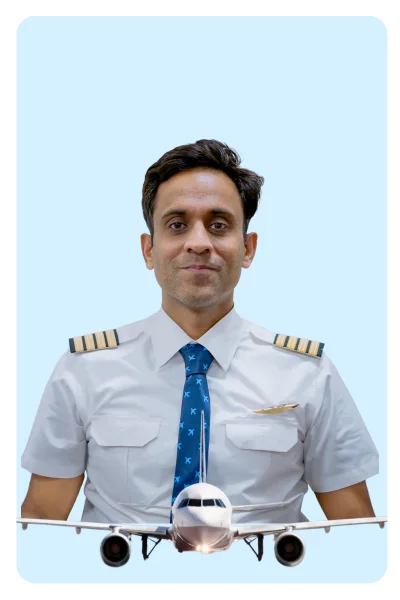I remember when my senior management captain, Captain Vikram Reymond, called me after I lost my mom. At that moment, he was just a captain to me, but that call changed everything. His gesture made him a true leader in my eyes.
His support during such a difficult time showed me the importance of compassion and connection in our field. I thought to myself that if he ever needed a favor, I would gladly help him out because of the respect I had for him.
Over time, I’ve realized that true leadership is about being there for others, especially in tough moments. It’s about lifting people up and showing them they’re valued. I strive to follow that example and be a source of support for aspiring pilots, just as Captain Vikram was for me. Leadership is about compassion and commitment, and I aim to embody those qualities every day.
Why Empathy Matters in Leadership
Unfortunately, not many people prioritize empathy in their roles, especially in high-pressure fields like aviation. I believe it’s crucial that we cultivate empathy from the ground up.
In India, many individuals aren't trained in these essential soft skills, which means we miss out on the human connection that can make a tremendous difference. I think we should start fostering empathy early on, teaching it just as we would any technical skill.
The aviation industry, in particular, needs leaders who prioritize empathy in their interactions with others—be it colleagues, crew members, or passengers. When we embrace empathy, we create a more supportive and understanding workplace. It’s time to nurture empathetic leaders in aviation, making the industry not just safer, but more human-centered for everyone involved.
1. Listening with Intent
I believe that just listening isn’t enough. It’s essential to listen with the intent to truly understand the other person. That’s what makes the difference.
When the intent is pure, you can really feel it. Unfortunately, not many people excel at this kind of deep listening. It’s important to go beyond the surface and connect with the other person’s thoughts and feelings.
Understanding someone from the roots—acknowledging their perspective and emotions—is key. This level of empathy fosters stronger relationships and helps create a supportive environment, whether in aviation or any area of life. Taking the time to truly understand others can lead to more meaningful connections and better collaboration.
2. Putting Yourself in Others’ Shoes
I believe we need to make a genuine and conscious effort to put ourselves in others' shoes. Think about it—what if we were going through the same challenges, facing the same issues? How would we feel? This kind of empathy is crucial for building understanding and compassion in our world.
In this era of artificial intelligence, where technology is advancing rapidly, we definitely need more human connection and empathy. As we start interacting more with machines and robots, it’s vital to remember the importance of human relationships.
We should prioritize developing empathy now, before our interactions become too mechanical. Fostering this quality will help ensure that as we progress, we maintain our humanity and create a better world for everyone. Let’s remember that empathy isn't just a nice-to-have; it's essential for our future!
3. Leading with Kindness, Not Fear
I believe that being approachable comes from being empathetic. When you truly understand people's problems and fears, and you can put yourself in their shoes, it creates a welcoming environment.
It’s important that people don’t feel hesitant or intimidated to approach you; instead, they should feel that you’re someone who can offer solutions. They should see you as a person who can empower, inspire, and motivate them.
This kind of approachable presence encourages open conversations and builds trust. When people know they can turn to you for support and genuine understanding, it fosters stronger relationships and a more positive community. Let’s strive to be that kind of person for others!
4. Empowering Others Through Support
In a creative environment, when you uplift and motivate others, you not only enhance their skills but also create a cycle of inspiration. I truly believe that everyone has unique gifts that they've been given; they just need to realize and embrace them.
When people tap into their God-given talents and share them with the world, it can lead to positive change for everyone around them. Trust me, if we all recognize and cultivate these gifts, we can contribute to making the world a better place.
Empowering others and celebrating their strengths creates a community where everyone can thrive. Let's work together to unlock those gifts and inspire one another to reach our fullest potential!
Final Thoughts: The Legacy of an Empathetic Leader
Let’s begin fostering a culture of empathy in leadership within aviation. It's vital to spread this mindset across our community. I feel a strong connection to empathetic leaders, particularly in the airline industry.
I've been inspired by several captains who embody this trait. It’s not just about being a skilled pilot or making perfect landings; it’s about their ability to care for their crew and passengers. Their empathy creates a supportive environment, making us feel valued and respected.
When we acknowledge and prioritize empathy in leadership, we not only enhance our workplaces but also improve the overall experience in aviation. Let’s work together to spread this message and inspire others to embrace empathy in their roles. It can truly transform our industry!
How does empathy influence your leadership style? Let’s work toward nurturing kindness together!!

 (12).png)




 (5).png)
 (7).png)
 (10).png)
 (12).png)
 (5).png)
 (4).png)
 (11).png)
 (3).png)
 (11).png)
.png)










